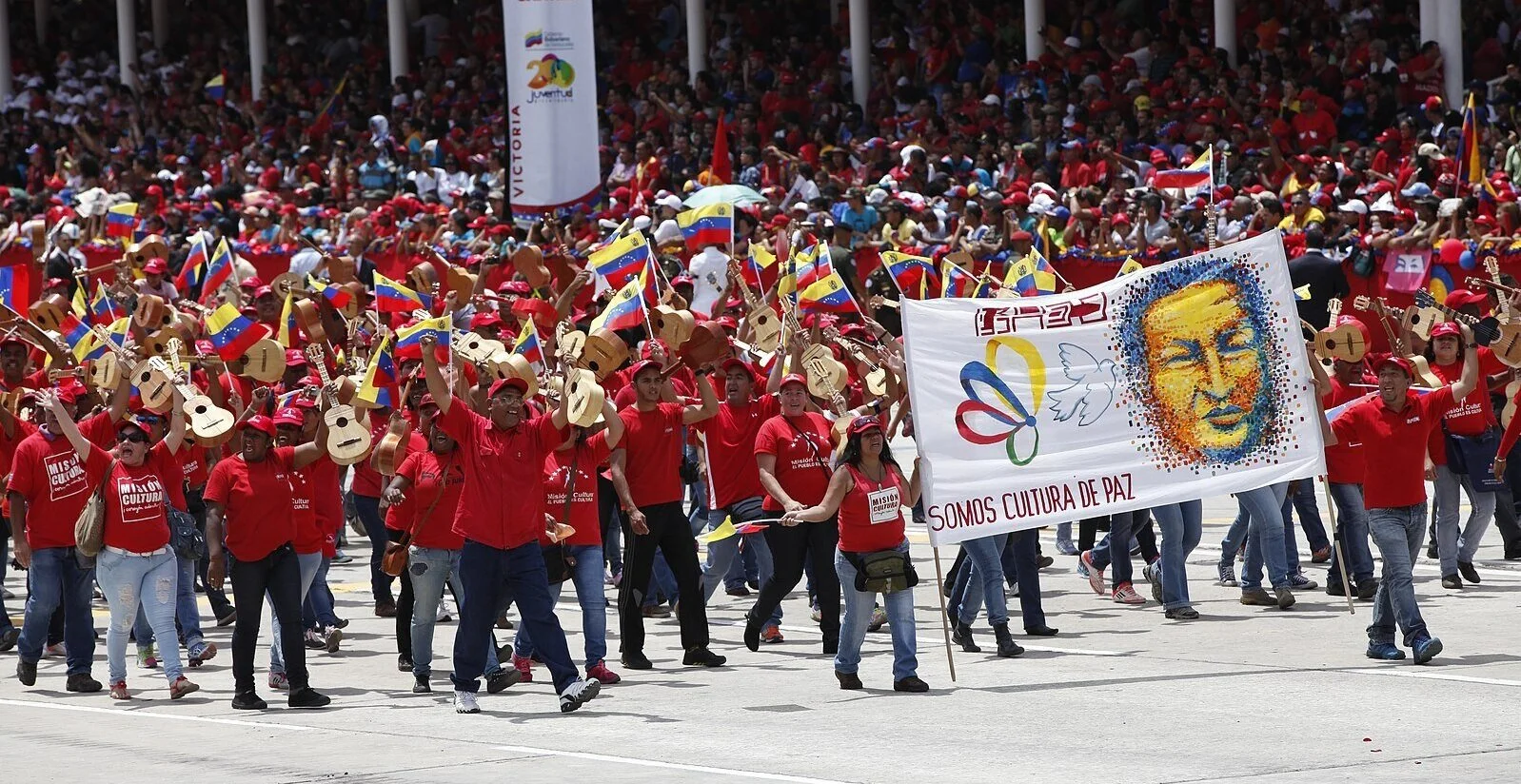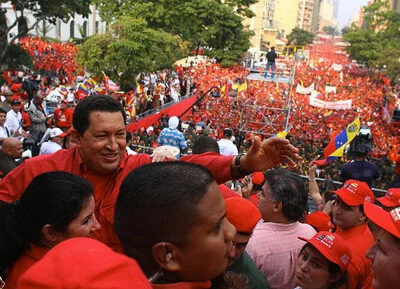Race, Class, and History: The Venezuelan Tragedy
Commemoration of the Death of Hugo Chavez, 2014.
Untitled by Ricardo Patiño, licenced under CC BY-SA 2.0
As you know, I have not posted thoughts on Latin America for some time. Covid has been a major distraction from normal activities. Confined to my desk at home for most of the last year or so, I have devoted considerable time to investigating populism in general and its particular manifestation in Latin America in particular. In an attempt to understand Chavez’s enormous popular appeal in Venezuela, and its ensuing tragic consequences, I began to read Hugo Chavez’s speeches, focusing on the ones delivered to the general public by nation-wide television and radio and those delivered to poor communities when he toured the country at election time. This made for fascinating reading; I came to understand the way in which history and context had shaped both the man, his political style, and, by extension, his enormous appeal. Venezuelans loved and reviled him; for much of his time in power those how loved him probably outnumbered those who hated him.
Populism as Politically Polarizing
Political Science likes grand theory; much of the literature is trying to develop a general theory of populism. Such an attempt may obfuscate much more than it illuminates, however. Those writing on Latin American, and particularly Venezuelan populism, stress the demagogic aspects of populist leaderships, their predisposition to authoritarian forms of political control, the antagonistic rhetorical appeal of populist leaders and the ensuing political polarization. While the perceived failure of institutions to respond to popular demands is often cited as a triggering component of the process, much of the discussion has focused on leaderships’ ability to foster hatred against entrenched elites—characterized as selfish “oligarchies.” These oligarchies are contrasted with the virtuous and deserving people to whom the leader is devoted.
From Conciliation to Intransigence
Chavez, president of Venezuela from 1999 until his death in 2012, certainly engaged in this type of rhetoric. However, prior to the attempted coup of 2002, a coup backed by the country’s traditional political elites, business interests and sectors of the middle classes, this negative characterization of the political opposition was moderate, sparce, and targeted almost exclusively to the political leaders of the country’s old political parties, the Democratic Action (AD) Party and COPEI (the Social Christian Party). Indeed, during his first few years in power Chavez met with the leadership of the country’s major organization of industrialists, Fedecámaras, assuring them that they and capitalism had a central place in Venezuelan development. Further, he appears to have cultivated a relationship with the Fedecámaras president from 1997 to 1999, Francisco Natera, who later became a minister in his cabinet. Chavez’s relationship with the technocratic managers of the state petroleum company, Pdvsa, was rocky from the start, however, as he sought to extract more revenue from resource development and reduce the influence of foreign companies.
Following the 2002 coup and his restoration to power, Chavez’s rhetoric against the oligarchy heated up enormously. By the mid-2000s, the oligarchy included not just the leadership of the old parties, but their supporters, and almost the entire business community, particularly Fedecámaras, which was singled out as an unpatriotic ally of North American imperialism. Chavez’s commitment to radical socialism, with an ever-diminishing role for capitalism, particularly big capitalism, becomes increasingly clear. By the late 2000s, U.S. imperialism was seen as the country’s main threat, with domestic groups as America’s weak and pathetic lackies.
Tapping into the True Source of Popular Angst
From the beginning, however, there were more important elements of Chavez’s presentation, rhetoric, and political style than his focus on an anti-patriotic oligarchy and U.S. imperialism. While Chavez, especially after 2002, did not hesitate to link poverty and inequality to both the oligarchy and imperialism’s penchant for neoliberal policies, his heavy focus on social issues resonated profoundly with the masses of less-well- off Venezuelans. From the outset, issues of dignity, poverty, misery, and inequality dominate Chavez’s speeches—mentioned far more frequently than references to the oligarchy and US imperialism. Further, these issues were not left as vague promises. Chavez detailed how he was expanding and would continue to expand access to health care and education (largely through his programs known as misiones). He often repeated his commitment to expand employment and provide land for farming. When visiting local communities, he would point to what new services had been provided and specify what new amenities in the form of credit, housing and other amenities, would be forthcoming.
President Hugo Chavez waves to supporters, 2007. by © Bolivar News Agency/Xinhua Press/Corbis CC BY-NC 2.0
Moreover, these issues were repeatedly linked to historical forms of exclusion and cultural/racial identity issues. Chavez, a history buff, claimed that popular suffering had its origins in the failure of the independence leader, Símon Bolívar, to achieve a genuine independence and a truly democratic republic that would accord a place of dignity and economic opportunity to the country’s Indigenous, Black, and mixed-race population. His speeches challenged the inherent racism of Venezuelan society. He declared that he was proud of his mixed Indigenous, African, and white heritage. He addressed the particular exclusions faced by Indigenous and Black Venezuelans and the standards that privileged those of European appearance. In several speeches, noting that the opposition considered him to be uncouth and ugly (referring to his dark skin and curly hair), he challenged the opposition to forget about his appearance long enough to actually listen to what he had to say. He addressed the opposition’s characterization of him as a “monkey” by explaining that white people’s DNA was just as close to a monkey’s as his own. Chavez, therefore, addressed the collective humiliation felt by a large proportion of the population, with its linked socio-economic and racial and cultural dimensions. The more the opposition resisted his calls for policies to improve the social conditions of the lower socio-economic groups, the more this rhetoric calling for racial/cultural and socio-economic equality resonated.
Establishing a Personal Connection to the People
Chavez professed a childhood of poverty in the state of Barinas and therefore declared that he understood the conditions of the masses and what their needs were. The son of rural school teachers, the social conditions of this early life were probably not as difficult as he claimed. However, his speeches at rallies involved close personal interaction with the audience in ways that related to their suffering. He would frequently single out individuals from the audience, asking their names and asking for details about their life and particular problems they faced. He would then follow these encounters with a description of how his polices were going to help that person and others with similar problems. If he spotted someone in apparent distress (an elderly person, for example, who appeared unwell), he would direct an official to provide aid. Such a personalistic approach was also used by Eva Peron. Offers of improved services and individual aid by a leader might best be described as “populist.” However, this rhetoric and style was never juxtaposed with the demonization of the political enemy—the oligarchy and U.S. imperialism. In fact, when speaking to the disadvantaged Chavez frequently called for love, tolerance and particularly for non-violence. He repeatedly claimed that his 21st century socialist revolution was a peaceful one.
At the same time, Chavez evinced a strong dislike for the country’s political opposition. He characterized the country’s oligarchy as immoral and unpatriotic and U.S. imperialism as evil (though he was always careful to say that the U.S. government was, not the American people, who he cared about). By the mid-2000s, Chavez had despaired of any form of cooperation from the Venezuelan business community. He railed against the mass media treatment of his regime, and did not hesitate to revoke the licenses of media outlets he felt had been treating him unfairly. After 2002 until his death in 2012, Chavez was increasingly preoccupied with possible plotting among his political opponents and the pressure for his removal from power by the U.S. By 2010, U.S. imperialism replaced the oligarchy as the country’s main enemy. While Chavez always proclaimed the importance of the electoral process, it is also true that that his regime became increasingly centralized. He often proclaimed that the opposition must never be allowed to return to power because should they do so they would return the country to free market polices, dismantle his social reforms, and the poor would suffer. By 2010, he had concluded that there was no possibility of any form of compromise with the opposition. His speeches also clearly revealed his determination to remain as president until the 2020s.
Venezuela is deeply polarized. But this was a process driven as much by the opposition and U.S. pressure as by the political movement that Chavez fostered. Chavez’s initial position was conciliatory. That position became progressively rigid after 2002, although there were conciliatory gestures calling for a strategic alliance with industrialists even in 2003. It was Chavez’s appearance, his symbolic representation of the previously excluded, his rhetorical commitment to social justice and redistribution, and his policies, such as land redistribution, that made his continued hold on power untenable to the forces of the opposition. The ever-increasing intensity of that opposition was instrumental in accelerating Chavez’s revilement of his foes. The historical context was polarizing. Chavez merely brought that reality to its inevitable culmination.



